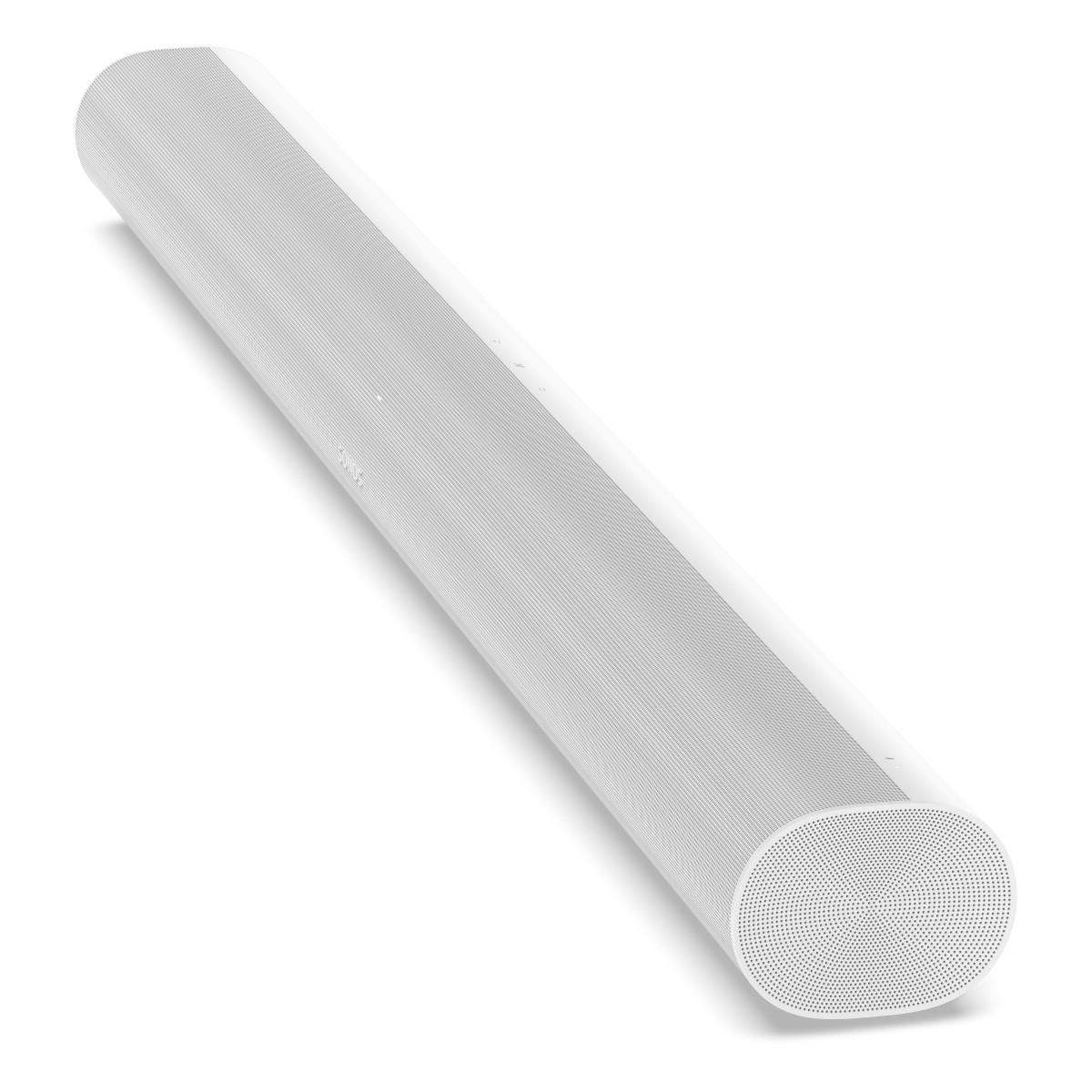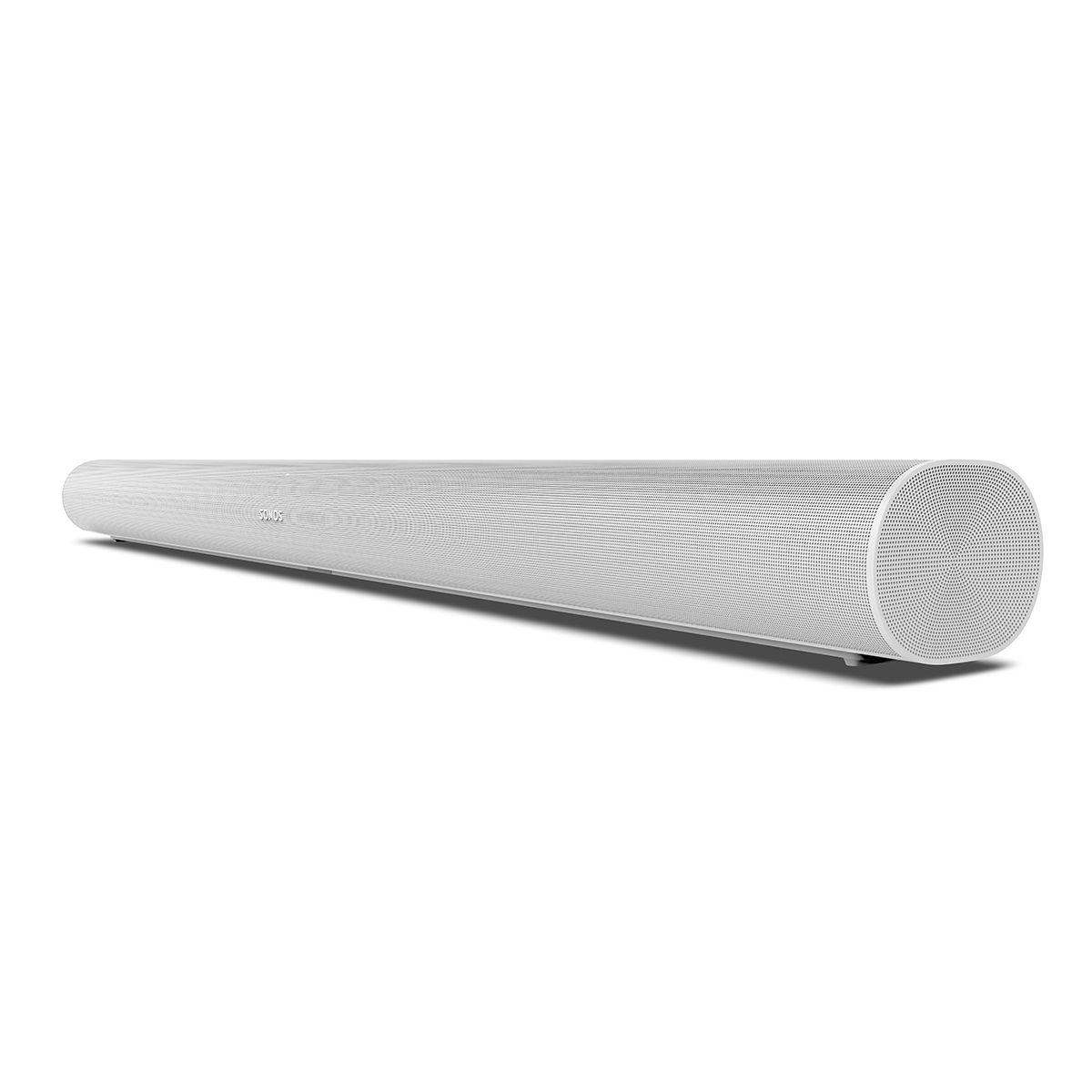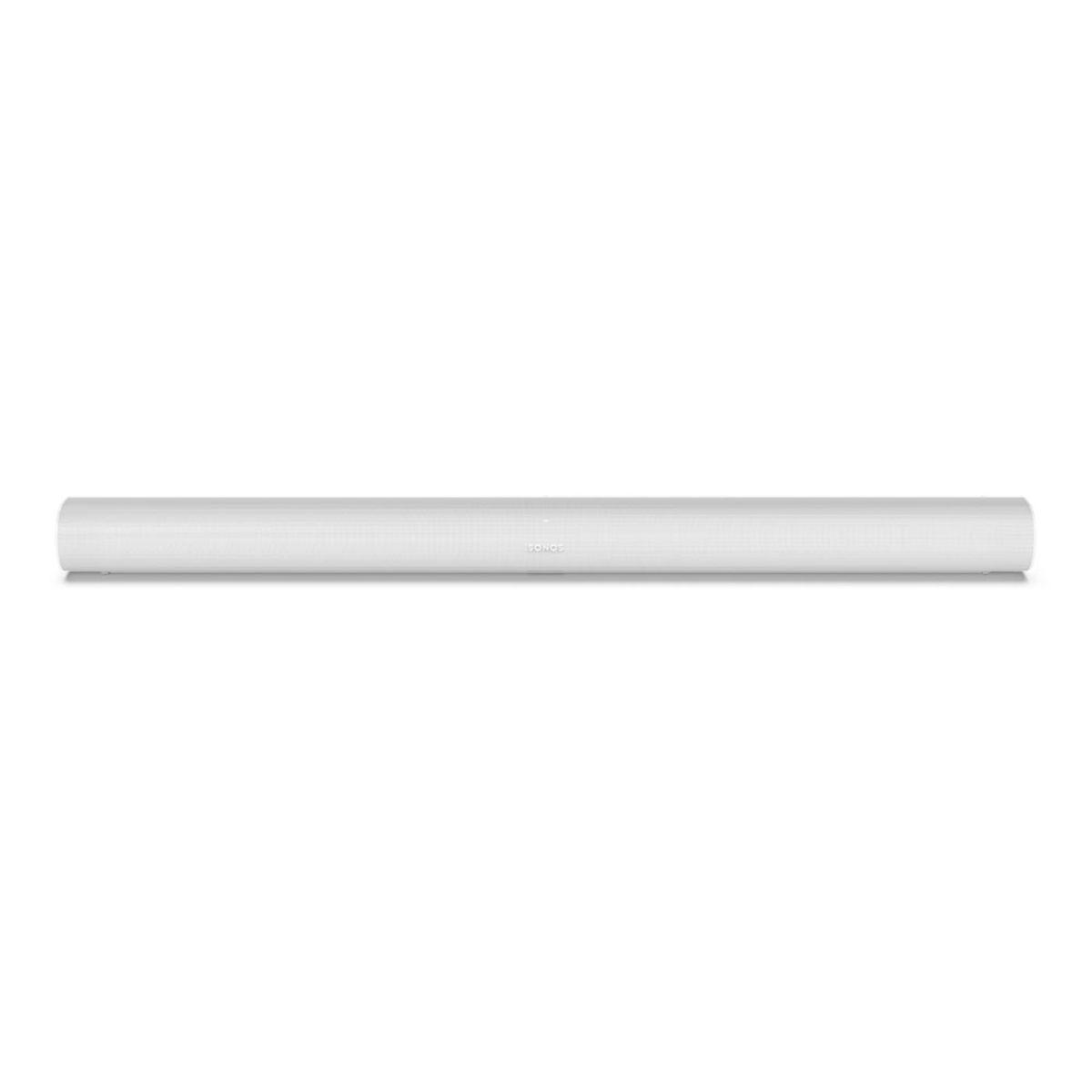
When it comes to upgrading your TV's sound, premium soundbars have become increasingly sophisticated, offering features that rival traditional home theater setups. Today, we're comparing two flagship models: the $899 Sonos Arc and the $1,499 Sennheiser AMBEO Plus. Let's dive into what makes these premium soundbars special and help you decide which might be right for your setup.
The soundbar market has transformed dramatically in recent years. When the Sonos Arc launched in 2020, it set a new standard for what was possible in a single-unit sound system. Its implementation of Dolby Atmos (which creates 3D sound by bouncing audio off your ceiling and walls) showed that convincing surround sound could come from a sleek, living room-friendly package.
The AMBEO Plus, released in 2022, took a different approach, focusing on raw audio performance and advanced room calibration. It's like having a sound engineer optimize your audio system every time you turn it on.

The Sonos Arc excels at creating an immersive soundstage - that's the perceived width and height of the sound you hear. Its eleven digital amplifiers power custom-designed drivers (speakers) that work together to create convincing surround effects. When watching action movies, explosions feel powerful but controlled, while quiet dialogue remains crystal clear thanks to dedicated center-channel speakers.
The AMBEO Plus takes things further with more sophisticated audio processing. Its AMBEO 3D technology creates more precise sound positioning - you can better tell exactly where a helicopter is flying overhead or where footsteps are coming from behind you. It also delivers deeper bass without a separate subwoofer, thanks to dual 4-inch woofers specifically designed for low frequencies.
Both soundbars handle music differently. The Arc's more neutral sound signature makes it versatile across genres - from classical to hip-hop. Its integration with the Sonos ecosystem means you can easily stream high-quality audio from services like Tidal or Apple Music.
The AMBEO Plus offers more customization for music, with detailed EQ controls and sound modes. Its additional processing power can make stereo music feel more spacious, though some purists might prefer to disable this feature for a more traditional presentation.

This is where the Sonos Arc really shines. It integrates seamlessly with other Sonos speakers for whole-home audio, and the app experience is incredibly polished. You can start playing music in your living room and expand it to other rooms with a couple of taps. The Arc also works with Apple AirPlay 2, making it easy for iPhone users to stream audio directly.
The AMBEO Plus offers more traditional connectivity options, including Bluetooth and Chromecast. While it doesn't have its own ecosystem, it's more flexible in terms of physical inputs, with multiple HDMI ports and analog connections.
Both soundbars offer voice assistant support, but the Arc's implementation feels more mature. It has a far-field microphone array that can hear commands even when movies are playing loudly. The AMBEO Plus supports voice control but it's not as deeply integrated into the experience.

The Arc's Trueplay tuning (which requires an iOS device) analyzes your room's acoustics by having you walk around waving your phone while it plays test tones. It's effective but limited to Apple users. The AMBEO Plus takes a more sophisticated approach with built-in microphones that automatically calibrate the system, accounting for room size, furniture placement, and even ceiling height.
In my testing, both soundbars impressed with their ability to fill medium to large rooms with detailed sound. The Arc creates a convincing sense of height with Atmos content, though the effect is more pronounced in rooms with standard-height ceilings (8-9 feet).
The AMBEO Plus generally produced more impactful bass and handled dynamic range (the difference between quiet and loud sounds) more confidently. However, the Arc's sound signature was more consistently enjoyable across different content types.
At $899, the Sonos Arc represents strong value despite its premium price. Its ecosystem benefits, regular software updates, and ability to expand with additional speakers make it a versatile long-term investment.

The AMBEO Plus at $1,499 is a significant step up in price. While it offers superior standalone performance, you're paying for advanced audio processing and premium components that might go unnoticed in casual listening.
Choose the Sonos Arc if:
Choose the AMBEO Plus if:
Both soundbars represent the cutting edge of what's possible in home audio, but they serve different needs. The Arc excels as a versatile, user-friendly solution that can grow with your needs, while the AMBEO Plus pushes the boundaries of what's possible from a single-unit sound system.
Remember that room size and layout significantly impact performance. If possible, try to audition these systems in conditions similar to your home setup before making a final decision.
| Sonos Arc | Sennheiser AMBEO Plus |
|---|---|
| Price - Key consideration for value | |
| $899 (good value for features) | $1,499 (premium pricing) |
| Power Output - Impacts maximum volume and dynamic range | |
| 11 Class-D amplifiers (detailed power not specified) | 400W total system power |
| Audio Channels - Determines surround sound capability | |
| 5.0.2 virtual channels | 7.1.4 virtual channels |
| Drivers - More quality drivers typically mean better sound | |
| 11 drivers (3 tweeters, 8 woofers) | 9 drivers (7 main drivers, 2 up-firing) |
| Bass Response - Important for movie impact | |
| Down to 45Hz (requires optional sub for deeper bass) | Down to 38Hz (better native bass response) |
| Room Calibration - Optimizes sound for your space | |
| Trueplay (iOS devices only) | Automatic self-calibration (all devices) |
| Smart Features - Affects ease of use and integration | |
| Alexa, Google Assistant, AirPlay 2, Sonos app | Alexa, Google Assistant, AirPlay 2, Chromecast |
| Multi-room Capability - Important for whole-home audio | |
| Full Sonos ecosystem integration | Limited to Chromecast groups |
| Connectivity - Determines source compatibility | |
| 1x HDMI eARC, Ethernet, Wi-Fi | 2x HDMI, Optical, RCA, USB, Ethernet, Wi-Fi, Bluetooth |
| Size - Consider your TV and space | |
| 45 x 4.5 x 3.4 inches (sleeker design) | 47 x 5.3 x 3.9 inches (larger footprint) |
| Expandability - Future upgrade potential | |
| Compatible with Sonos Sub and surrounds | No dedicated matching speakers available |
| Audio Format Support - Affects content compatibility | |
| Dolby Atmos, TrueHD, Digital Plus, DTS | Dolby Atmos, DTS:X, MPEG-H |
| Voice Enhancement - Important for dialog clarity | |
| Speech Enhancement mode, Night mode | Dynamic dialog enhancement, Night mode |
The $1,499 AMBEO Plus offers superior movie performance with more precise sound positioning and deeper bass. However, the $899 Sonos Arc still delivers excellent movie audio at a lower price point.
The AMBEO Plus has stronger built-in bass and may not need a subwoofer. The Sonos Arc benefits from adding a subwoofer for deeper bass, especially for movies.
Both perform well, but the Sonos Arc offers more natural music playback and better streaming integration. The AMBEO Plus provides more customization options for music settings.
Yes, both soundbars work with any TV that has HDMI ARC/eARC connections. They also include optical adapters for older TVs.
The Sonos Arc has a simpler setup process and more user-friendly app. The AMBEO Plus has more connection options but requires more technical knowledge to optimize.
Yes, both the Sonos Arc and AMBEO Plus support Dolby Atmos for immersive 3D sound.
The AMBEO Plus performs better in larger spaces due to its more powerful output and advanced room calibration. The Sonos Arc is ideal for small to medium-sized rooms.
Both support voice control through Alexa and Google Assistant, but the Sonos Arc has better voice recognition and integration.
The Sonos Arc offers superior streaming capabilities through the Sonos app and ecosystem. The AMBEO Plus includes Bluetooth, which the Arc lacks.
The AMBEO Plus justifies its higher price with better sound quality and processing, but the Sonos Arc offers better value for most users.
The Sonos Arc can be expanded with Sonos surrounds and subwoofers. The AMBEO Plus doesn't have dedicated matching speakers for expansion.
The Sonos Arc has a more refined, user-friendly app experience. The AMBEO Plus app offers more detailed audio adjustments but is less intuitive.
We've done our best to create useful and informative comparisons to help you decide what product to buy. Our research uses advanced automated methods to create this comparison and perfection is not possible - please contact us for corrections or questions. These are the sites we've researched in the creation of this article: whathifi.com - soundandvision.com - en.community.sonos.com - cnet.com - worldwidestereo.com - abt.com - creativeaudio.net - target.com - sonos.com - worldwidestereo.com - businessinsider.com - en.community.sonos.com - youtube.com - techradar.com - pocket-lint.com - moon-audio.com - stereonet.com - rtings.com - abt.com - projectorscreen.com - youtube.com - videoandaudiocenter.com - crutchfield.com - sennheiser-hearing.com - newsroom.sennheiser.com